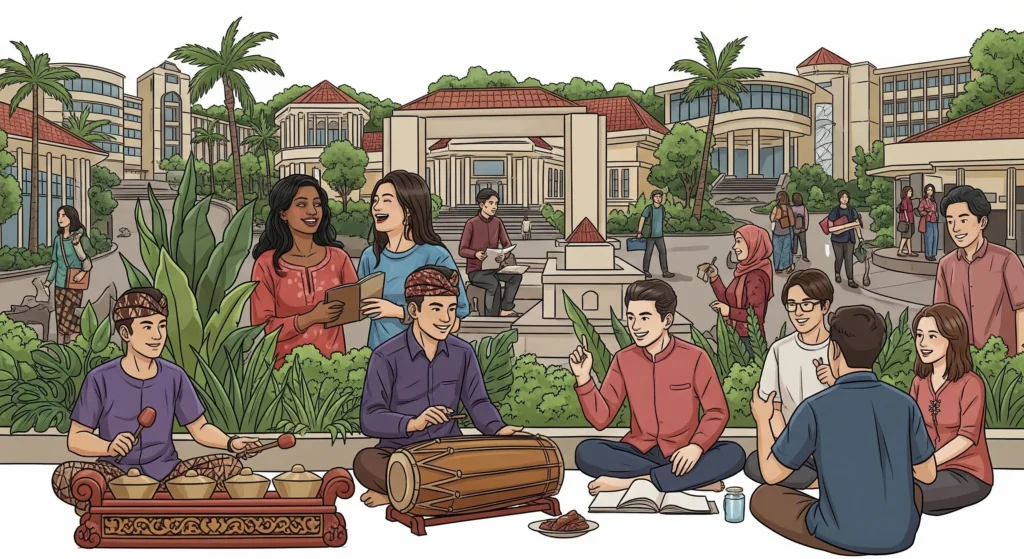Student Life and Culture in Indonesia is about more than classrooms — it’s about where you live, what you eat, how you make friends, and how you feel welcomed here as an international student.
If you’re thinking about studying in Indonesia, you’re probably not just asking, “Which university?” — but also: “What’s daily life really like?”
This guide is an honest peek into real student life — the good, the different, and the parts you’ll grow to love.
Want the bigger picture of how Indonesia’s education system works? See Education in Indonesia.
See Table of Contents
Where You’ll Live: Kos, Community, and New Friends

Most international students stay in a kos — a boarding house close to campus. It’s simple, affordable, and often feels like a second family.
In cities like Yogyakarta or Malang, rent can be as low as USD 50–100 per month. In bigger cities like Jakarta, students often prefer apartments for privacy, though they cost more.
The best part? Living near campus means you can hang out at cafes, join late-night study groups, or join local student clubs without spending much on transport.
What You’ll Eat: Cheap, Tasty, and Maybe Spicy
If you love food, Indonesia is paradise — but brace yourself for spice!
Many students grab meals at the campus canteen or small warungs near their kos. A filling meal often costs just USD 1–2.
It’s normal to eat rice three times a day — you’ll soon pick your favorite sambal (chili sauce).
International restaurants exist, but eating local is cheaper and helps you connect with local friends.
See It Yourself: Daily Life Videos
If you want to really picture what life is like as an international student here, these two videos are worth watching. One shows the daily routine of a student living in a kos — waking up in a simple room, grabbing affordable street food, attending classes, and hanging out with friends in the evening. You’ll see how relaxed and friendly daily life can be. Watch it here:
The other video is a fun glimpse at how foreign students slowly pick up Indonesian habits. It shows them trying spicy street food, using Bahasa Indonesia for casual chats, joining local campus events, and learning to respect small but important customs. It’s an honest, sometimes funny look at what adapting to life in Indonesia feels like. See it here:
Adjusting to Local Culture: Small Things Matter
One thing many students love about Indonesia is how warm people are.
Learn a bit of Bahasa Indonesia — simple words like terima kasih (thank you) or permisi (excuse me) make a big difference.
Politeness is important. Students greet professors with a nod or handshake. Locals rarely say “no” directly — so read body language and tone.
Feeling unsure? Ask! Most people are happy to explain or help.
If you want to understand why people here are so welcoming, read Indonesian Culture and History.
Weekends: Travel, Nature, and Festivals
Your life here won’t just be about books.
Weekends are for day trips with friends: temples, beaches, waterfalls — you name it.
Many campuses hold cultural festivals where students perform traditional dances, cook dishes from their hometowns, or just hang out together.
If you love the outdoors, you’re in the right place — Indonesia’s nature is stunning, affordable, and often right outside the city.
Need ideas? Check out Tourist Destinations in Indonesia and Natural Beauty of Indonesia.
Is It Safe?
Most student cities are friendly and generally safe.
Use registered taxis or ride-hailing apps. Be mindful when trying street food — trust busy stalls!
Keep your local buddy’s contact saved — people here are happy to help if you ever need it.
Real Words from Students
“I’m from Vietnam and study in Yogyakarta. At first, the food was so spicy, but now I crave it! My kos friends feel like family.”
— Linh, Vietnam
“I learned simple Bahasa Indonesia before I arrived — it really helped me make friends and feel welcome.”
— Adnan, Pakistan
Final Thoughts
Living and studying in Indonesia is not just about what you learn in class — it’s about everyday moments:
sharing meals, laughing with friends, and learning to see life from a new point of view.
If you’re ready to be open-minded, you’ll find Indonesia warm, affordable, and full of adventure.
Frequently Asked Questions about Student Life in Indonesia
Is Indonesia safe for international students?
Most student cities in Indonesia, like Yogyakarta, Bandung, and Malang, are considered friendly and safe. Students should still stay alert, use registered taxis or ride-hailing apps, and be mindful when trying street food.
What is the cost of living for students in Indonesia?
Living costs vary by city but are generally affordable. Many international students spend around USD 200–400 per month for housing, food, transport, and daily needs, depending on their lifestyle and location.
What are student dorms or kos like in Indonesia?
A kos is a boarding house near campus. It’s simple and affordable, often including basic furniture and sometimes shared kitchen or laundry. Many students find it’s the best way to live close to campus and make local friends.
How do international students adapt to Indonesian culture?
Most students learn simple Bahasa Indonesia phrases, join campus clubs, and build friendships with local students. Respecting local customs and being open-minded helps them adjust smoothly to daily life.
What can students do on weekends in Indonesia?
Many students travel on weekends to visit temples, beaches, or join community activities. Indonesia’s natural beauty and diverse destinations make short trips easy and budget-friendly, even for students.
Human-First Takeaway:
Come curious. Stay humble. Eat the sambal — or at least try! And remember: you’re never really alone here.
As an additional academic resource, you may also refer to the study “International Students’ Experience of Studying at Indonesian Universities.” This article provides a systematic review of how international students adapt to campus life, local culture, and learning challenges in Indonesia. Read the full article via its official DOI link: https://doi.org/10.32674/jis.v10iS(2).2710 .
